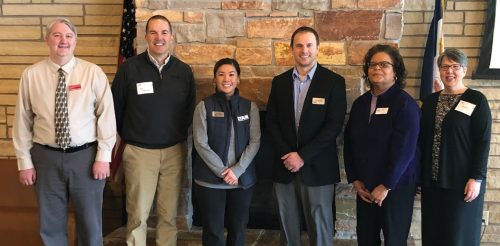Building a new federal courthouse in downtown Des Moines is much more complicated than signing the paperwork and pouring concrete.

“It comes with significant challenges,” said Elizabeth Campbell, director of Emerging Business Inclusion for Ryan Companies, the Minneapolis-based firm that landed the Des Moines courthouse’s three-year, $105 million contract.
One of them is the subcontracting.
Ryan, like any large company awarded a federal government contract worth more than $700,000 ($1.5 million for construction), is legally required to spend part of that amount on small businesses. Exact details of any given subcontracting plan are confidential, but the U.S. Small Business Administration has a nationwide target of annually spending 23 percent of the government’s procurement money on small businesses.

What does that mean? For Ryan Companies, it meant the need to come into town and hire 11 different types of construction contractors—companies that then would require vetting to make certain that Ryan’s potential subcontractors met the legal definition of a small business, that they were properly registered with the government, and that the companies were effective enough to deliver on the contract requirements.
“The alternative for us would be to blindly go into the (online) Dynamic Small Business Directory, do NAICS code searches by geography and business type, and have no idea when we call the names up what those companies’ capabilities are,” Campbell said.
Instead, Ryan turned to CIRAS for help.
Specialists with the CIRAS Procurement Technical Assistance Center (PTAC) worked closely with Ryan Companies to hold two “small business outreach” events in February 2019 and February 2020 so the company could recruit prospective subcontractors. Both before and after those events, CIRAS worked with Ryan to make certain that subcontractors understood all the relevant contract clauses and how to register their businesses in the government’s contract management computer system.
CIRAS also created a special reference guide to help would-be subcontractors determine their eligibility for a host of special socioeconomic programs. The programs provide special competitive advantages for companies owned by women, service-disabled veterans, or socially and economically disadvantaged individuals, as well as businesses located in certain economically disadvantaged districts.
“Some contractors might not have much government contracting experience—or at least not at the federal level,” said CIRAS government contracting specialist Justin Niceswanger. “We certainly can help those smaller companies understand what they need to know.
“But we also can help the larger companies understand their marketplace and help them find the contacts they need.”
Campbell praised the value CIRAS brings to larger businesses simply by understanding Iowa’s communities and the small businesses within them.
“Prime contractors may not even be aware of all the valuable services that CIRAS provides to companies like us,” she said. “They’re great partners to work with.”
For more information, contact Justin Niceswanger at jnice@iastate.edu or 515-509-9565.
A version of this article was published in the Fall 2020 edition of CIRAS News. To read more of that edition or others, please explore elsewhere on our website.